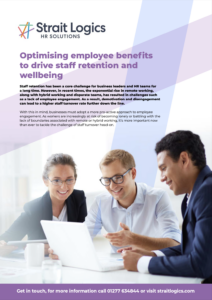
With the buzz surrounding AI, it’s no surprise that we’re frequently asked by clients and prospects about our stance on integrating AI into our HR solutions. Many are eager to know: Will AI be a part of our platform in the future? Is this the next big thing for HR?
The short answer is no, not right now. But let’s take a closer look at why. While AI holds incredible potential in many industries, when it comes to managing sensitive employee data (such as information found in Total Reward Statements or within a rewards portal) we believe the risks far outweigh the benefits – at least for now.
AI in HR: The Promises and Pitfalls
AI is undoubtedly a powerful tool, and it has already made a mark in various business processes. From recruitment to performance management, many companies are exploring AI as a way to streamline operations and improve efficiency. There are even HR-specific AI tools focused on recruitment, where AI is used to review resumes, match candidates to roles, and even manage the initial stages of the hiring process. These tools can certainly be beneficial, helping HR managers save time and improve efficiency.
However, AI is not a one-size-fits-all solution for HR. When it comes to using AI in managing sensitive employee data – like that in Total Reward Statements or flexible benefits packages, the risks are significant.
Data Security Risks: A Key Concern
At Strait Logics, we recognise that the data handled by our platform is highly personal. The Rewards Portal platform processes this information securely using our proprietary methodologies, building upon the advanced security features provided by AWS. In addition, the platform undergoes regular and rigorous penetration testing and service monitoring to ensure its security and availability. Given the sensitivity of this data, implementing AI in this environment could introduce potential security risks, which companies simply cannot afford to overlook.
AI systems typically require access to large volumes of data to function effectively. This can increase the chances of unauthorised access, data exposure, or misuse. A breach of this kind could lead to financial and reputational damage, especially when it involves personal employee information. Companies using AI systems need to ensure that robust security measures are in place, as they bear the responsibility for protecting their employees’ privacy.
AI Bias in Recruitment and Decision-Making
While recruitment is not an area where our platform is involved, we want to highlight the broader impact of AI in HR, particularly when it comes to ethical considerations. AI tools, such as an Applicant Tracking System (ATS), used in recruitment have made a big impact in HR managers looking to improve efficiency, but they come with certain risks. AI models are only as good as the data used to train them. If the data contains historical biases – based on gender, race, or socio-economic status – the AI system will inevitably replicate these biases in its decision-making.
A 2024 study by the University of Washington revealed that AI systems used for resume screening exhibited significant racial and gender biases. For instance, AI recruitment systems have historically been shown to favour male candidates for roles traditionally dominated by men, simply because the AI is trained on historical data that reflects these trends (source). This can lead to a hiring process that inadvertently excludes qualified candidates from underrepresented groups. Additionally, AI decision-making often lacks transparency, meaning that the rationale behind a decision may be unclear, making it harder to ensure fairness and accountability in HR practices
The ethical considerations around AI don’t stop there. Even as AI in recruitment becomes more common, it has become clear that machine learning models can exhibit racial, gender, and even socioeconomic biases. According to Forbes, AI-driven recruitment can unintentionally perpetuate systemic biases, which can lead to discriminatory hiring practices, even when these systems are meant to be neutral and objective.
Although these biases are particularly relevant to recruitment tools, they serve as a broader reminder of the ethical considerations when integrating AI into any HR function. We believe these concerns highlight the need for caution, especially when decisions can affect people’s careers, personal development, and opportunities.
Ethical Implications: Balancing Technology and Humanity
The ethical implications of AI in HR cannot be ignored. While AI might make processes faster, it cannot replace the human element of HR. HR decisions – whether it’s about promotions, pay raises, or employee development – require a level of empathy and understanding that AI simply can’t provide.
At Strait Logics, we believe that HR is about more than just numbers and algorithms. Human insight is crucial when it comes to understanding the nuances of performance, potential, and personal circumstances. AI lacks the ability to factor in the full range of human complexity, and when dealing with employees’ careers, it’s essential to rely on human judgment.
Never Say Never: The Future of AI in HR
We’re not saying that AI has no place in the future of HR – far from it. We continue to watch its developments closely, and there are certainly ways AI can be beneficial to HR, particularly in areas like administrative tasks or large-scale data processing. However, when it comes to handling the highly personal and sensitive data of employees, especially information in flexible benefits packages or Total Reward Statements, we believe it’s too risky to implement AI without more robust security protocols and ethical guidelines.
That doesn’t mean this path of innovation is off the table. In fact, creating a personalised benefits experience doesn’t require AI at all. HR managers can use existing tools like Rewards Portal to curate tailored packages for employees based on real-time platform data, survey feedback, and usage reports. This kind of insight-driven decision-making supports individual needs—securely and transparently—without exposing sensitive information to unnecessary risk.
As technology advances, it’s possible that we’ll reach a point where AI can be safely integrated into HR systems. For now, though, we believe that the priority should be on providing secure, transparent, and human-driven solutions that keep employee data safe.
At Strait Logics, we are committed to ensuring that our clients’ HR systems remain secure and reliable, with the well-being of employees at the forefront of everything we do. While AI may have a place in the future, security will always be our primary concern when it comes to managing sensitive employee data.
By considering the risks associated with AI, we ensure that we are taking a holistic and thoughtful approach to HR technologies – balancing the potential of AI with the necessity of maintaining security, fairness and transparency.
As HR continues to evolve, maintaining a balance between innovation and security is essential. At Strait Logics, we are committed to helping businesses manage their Total Reward Statements and flexible benefits with transparency and robust information security. If you’re ready to explore secure, human-centric HR solutions, contact us today to discover how our Rewards Portal platform can streamline your HR processes safely and effectively.

